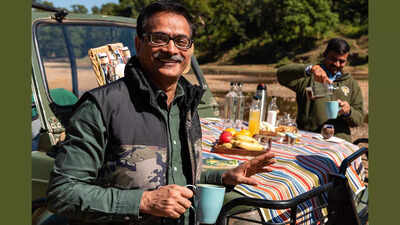ARTICLE AD BOX

Gajendra Singh Rathore, MD, Jungle Camps India
In a move that underscores how culinary programming has become as central to luxury wildlife travel as the safaris themselves, Jungle Camps India Limited has engaged Chef Michael Swamy as its consulting chef across its portfolio of forest lodges and tented camps.The partnership, announced on Friday, will see Chef Swamy — a noted food stylist, writer, photographer and Le Cordon Bleu alumnus — shape menus, develop recipes and tighten kitchen operations at the company’s properties. He will also lead staff training, oversee quality and safety protocols and help articulate a single, coherent food philosophy that draws on local produce and traditional recipes.“Our effort at Jungle Camps India has always been to give guests a deeper sense of place, not only through the safari but also through food,” said Gajendra Singh Rathore, the company’s managing director.
“Chef Michael Swamy brings wide knowledge of local ingredients and age-old cooking traditions combined with contemporary flair. This collaboration will offer guests food experiences as unique as the forests that surround our camps.
”The announcement arrives amid a broader shift in experiential travel: an emphasis, operators say, on authenticity and sensory immersion. Guests at premium nature lodges increasingly expect food to tell the story of a place — its people, its seasons and its landscape — rather than simply to serve as fuel between game drives.
For Jungle Camps India, the promise is clear: cuisine that reflects “forests, villages, and local culture,” not restaurant fare transplanted into the wilderness.Chef Swamy, who has led culinary experiences described by clients as “forest-to-table” and “wild cook” events, said his work with the resorts would be rooted in memory and regional narrative. “Every region carries stories that can be expressed through cuisine, and I aim to create menus that blend comfort, nostalgia, and creativity,” he said.
“For me, food is an experience of memories, moments, and discovery.”Under the plan, guests can expect tasting menus and live demonstrations, outdoor dining experiences and even opportunities to cook alongside the chef. The company said the collaboration would map each property’s identity onto its plates: rustic, wheat-heavy food at one camp; fiery, spice-forward dishes at another; and foraging and forest produce featured where possible.Jungle Camps India highlighted a sampling of the regional dishes that will inform the new menus.At Rukhad Jungle Camp, guests may be offered pithla and bhakri — a simple, millet-based flatbread paired with a spiced gram-flour curry — emblematic of central India’s peasant kitchens. At Tadoba, the menu leans into the heat of western forest cuisines with Kolhapuri chicken and Saoji mutton. Kanha’s offerings will tap wild and seasonal ingredients — bamboo shoot curry and kachnar ki sabzi — while Pench plans to serve bafla and bhutte ka kees, dishes with deep local roots and seasonal resonance.For a hospitality company whose principal draw has long been wildlife sightings, the move represents an attempt to broaden the arc of a guest’s stay from the hours on a jeep to the hours at the table. “Each of our locations has a culinary story to tell, from the rustic flavors of central India to the fiery cuisines of western forests,” Mr. Rathore said. “With Chef Swamy’s guidance, these stories will come alive on the plate.
It will offer guests not just a meal but an immersion into culture, memory, and the wild surroundings that make every stay unique.”Industry observers say such collaborations serve multiple purposes. They raise a property’s profile in a crowded market, create additional programming that can justify higher nightly rates, and, when executed well, contribute to a more sustainable local economy by spotlighting regional producers.
For guests, they can be a compelling differentiator: a chance to taste heritage dishes prepared with care rather than commodified, pan-Indian menus.Chef Swamy’s résumé, which includes work for diplomatic missions and global brands as well as awards for contributions to food and art, positions him as a figure who moves comfortably between the worlds of high-end culinary staging and rooted, regional cooking. That duality may be useful in camps where logistics and supply chains can make menu work especially complicated: sourcing seasonally in remote areas, training cooks used to household styles of preparation, and reconciling guest expectations with what local harvests will allow.Jungle Camps India said the rollout of new menus would be phased, with pilot programs at select camps before wider adoption. The company has not disclosed financial details of the partnership.For now, the announcement offers a promise: that a night in the forest will be measured not only by the animals glimpsed in the headlights or the dawn chorus but by a plate that, in design and flavor, is trying to conjure place. If executed as described, the collaboration could make meals part of the camp’s storytelling — an extension of the safari narrative, and an asking for guests to slow down and taste the landscapes they have come to see.



.png)
.png)
.png)
















 2 hours ago
4
2 hours ago
4








 English (US) ·
English (US) ·